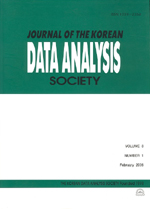교사의 삶의 질에 영향을 미치는 요인
The Stress, Depression, Quality of Life and Relating Factors in Teachers
- 한국자료분석학회
- Journal of The Korean Data Analysis Society (JKDAS)
- Vol.12 No.6
-
2010.123193 - 3205 (13 pages)
- 56

본 연구는 교사의 스트레스, 우울 및 삶의 질 수준과 삶의 질에 관한 영향 요인을 파악함으로 써 향후 교사의 스트레스, 우울 완화 및 삶의 질 향상을 위한 프로그램 개발의 기초자료를 제공하는데 목적이 있다. 연구방법은 마음수련 자율연수 프로그램에 참여한 108명의 교사를 대상으로 구조화된 설문지를 이용하여 스트레스, 우울, 삶의 질에 관한 자료를 수집하였다. 자료분석은 SPSS 12.0 program을 이용하여 실수, 백분율, 평균, 표준편차, t-test, ANOVA와 다중회귀분석을 하였다. 연구결과 교사의 스트레스, 우울 및 삶의 질 정도는 일반 성인인구와 비슷하며, 성별, 나이, 인지된 건강상태, 교직경력, 학급수, 직무만족 수준 등에서 유의한 차이를 보였다. 또한 교사의 삶의 질에 대한 주요 예측변인으로 스트레스, 우울 및 학급수로 나타났다. 결론적으로, 교사는 전인교육을 실시하는 주체로 스트레스, 우울로 인한 삶의 질 저하와 같은 부정적인 결과가 학생교육에 미치는 영향을 고려할 때 스트레스와 우울에 대한 관리가 매우 중요하다고 본다.
The purpose of this study was to investigate stress, depression, QOL of teachers. The participants in this study were 108 subjects, who attended Maum-meditation program. A structured questionnaire were used to collect data. Data were analyzed using SPSS 12.0 program. The results of this study can be summarized as follows. First, the degree of stress, depression, QOL of teachers is similar to general adults. Second, it showed significant difference in gender, age, perceived health status, career, class numbers, job satisfaction degree. Also, there are positive correlation between stress and depression. There are negative correlation between QOL and stress, QOL and depression. Predictive factors to QOL are stress, depression, class numbers, perceived health status. In conclusion, it is discovered that it is needed to manage stress and depression for wholism based education as a main subject.
Ⅰ. 서론
Ⅱ. 연구방법
Ⅲ. 연구결과
Ⅳ. 논의
Ⅴ. 결론 및 제언
참고문헌
(0)
(0)